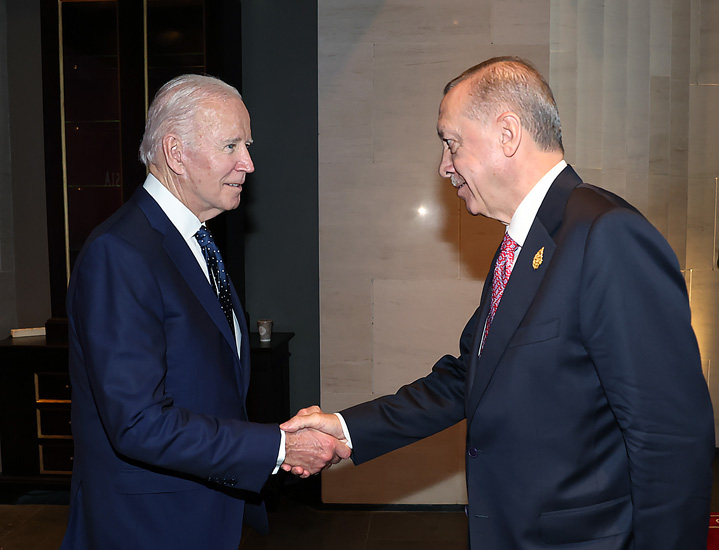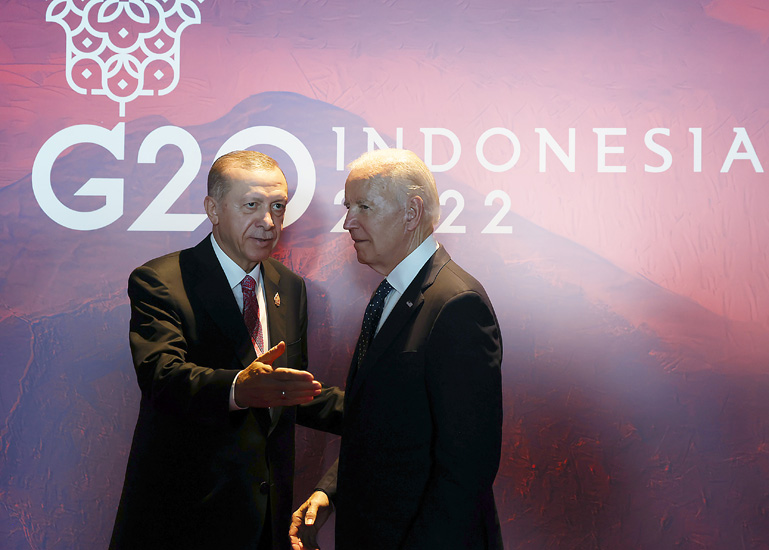This article highlights several complex issues affecting US–Turkey bilateral relations. The current state of US–Turkey relations can be characterised as tense and rather difficult. Furthermore, there seems to be no light at the end of the tunnel that might reduce tensions between these NATO allies.
Introduction: Human Rights or Humans without Rights in Turkey
Since the inauguration of President Biden in January 2021, the US administration has kept its relationship with Turkey to a bare minimum. For the Biden administration, the issue of human rights in Turkey remains very much on the agenda while for President Erdoğan, the issue seems to be a lower priority for his administration. Such behaviour infuriates not just Biden administration officials but also members of the House and the Senate. This has resulted in the Turkish president not being invited to Washington. Perhaps the two sides can each be blamed for their current relationship; however, Erdoğan is maintaining his course and appears unbothered by the consequences. For his part, Biden is keeping his cool despite a number of divergences in interests of the US and Turkey.
In addition to the human rights issue and the nature of their transactional relationship, Turkey urgently needs to modernise its ageing F-16 fleet since the first model was acquired in 1987. Therefore, both the modernisation and the purchase of advanced F-16 Block 70 fighter aircraft has become a difficult issue in the bilateral relationship as the two sides see things quite differently. In short, from Ankara’s perspective, Turkey’s needs are not being met by the Biden administration. Whether or not Erdoğan will decide to purchase fighter aircraft from another country is discussed further below.

Credit: Office of the President of Turkey
The F-16 Dilemma
When Turkey purchased the Russian-built S-400 air defence system in 2019, it was removed from the F-35 co-production programme. This distancing from the US has had repercussions – Turkey’s defence industry is now unable to bring its F-16 fighter aircraft to the Lockheed Martin F-16 Block 70 standard since it lacks the necessary know-how. As a result, Ankara requested permission from Washington to purchase 40 advanced F-16 Block 70 fighter aircraft and kits for the modernisation of its current fleet of 79 F-16 aircraft at a cost of USD 20 Bn in October 2021. The request is pending approval by the US Congress.
The Biden administration unofficially informed Congress in January 2023 of its intention to sell F-16 fighter aircraft to Turkey but it knows that both the House and the Senate strongly oppose the deal. One of the strongest opponents of the F-16 deal is Senator Bob Menendez, Chairman of the Senate Foreign Relations Committee. He did not hide his opinion and he certainly did not mince his words when he stated:
“I strongly oppose the Biden administration’s proposed sale of advanced F-16 aircraft to Turkey. President Erdoğan continues to undermine international law, disregard human rights and democratic norms and engage in alarming and destabilising behaviour in Turkey and against neighbouring NATO allies. Until Erdoğan ceases his threats, improves his human rights record at home – including by releasing journalists and [members of] the political opposition – and begins to act like a trusted ally should, I will not approve the sale.”
Such stances put the Biden administration in an awkward position with regards to securing approval for the sale. As long as Senator Menendez and others continue to oppose the sale of these aircraft, Turkey will not receive them, since Erdoğan is unlikely to change his behaviour and agree to Menendez’s conditions. Setting a possible timeframe for the sale is therefore probably unrealistic.
The potential sale of F-16 Block 70s to Turkey is further compounded by the Lockheed Martin backlog that affects countries that have already ordered the F-16 Block 70, such as Bahrain, Bulgaria and Slovakia, to name a few.
Whether or not President Erdoğan will decide to turn instead to President Putin, and order Su-35 fighter aircraft remains to be seen. This option was raised several years ago and may still be on the cards. This option, however, is likely to result in severe damage to the already frayed US–Turkey relationship and Erdoğan may think twice before making such a decision. The relationship between two presidents leads on to the next difficulty affecting relations between the US and Turkey.
Erdoğan’s Relationship with Putin
An additional sore point between the two countries remains the cordial relations between the Turkish and Russian presidents, which is viewed by the Biden administration with considerable concern. Erdoğan embracing NATO’s adversary is seen as undermining NATO unity. In addition, Russian financial support for Erdoğan’s administration remains a problem for the US. Washington is of course aware that Russia has agreed to a cheap energy deal which Turkey pays for in Russian roubles. Russia has also prepaid USD 5 Bn for the construction of the Akkuyu nuclear power plant (NPP).
Finally, Russian tourists returned to Turkey last summer in the post-COVID era resulting in a welcome cash inflow to the Turkish Finance Ministry. Thus far, the US reaction remains tempered. For instance, Deputy Secretary of the Treasury, Wally Adeyemo, spoke with Deputy Finance Minister of Turkey, Yunus Elitas, on 19 August 2022 to discuss ongoing efforts to implement and enforce the broad multinational sanctions imposed on Russia after its invasion of Ukraine. Adeyemo raised concerns that Russian entities and individuals were attempting to use Turkey in order to evade sanctions put in place by the US and 30 other countries.
Additionally, while in Istanbul, Under Secretary of the Treasury for Terrorism and Financial Intelligence, Brian Nelson, met with the Banks Association of Turkey on 3 February 2023 to discuss the implementation of international sanctions on Russia for its war against Ukraine. Nelson raised concerns that Russian oligarchs and government officials have continued to buy property, dock their yachts, run businesses and receive services for their property in Turkey. Turkey’s refusal to join EU and NATO sanctions on Russia also bedevils the state of bilateral relations. Any explanation originating from Turkey as to why Erdoğan’s administration refused to join the sanctions lends supports to the argument that the relationship between the two countries is fundamentally transactional.
Furthermore, the US Senate in particular views Erdoğan’s relationship with Putin as a betrayal of the NATO allied ethos, since NATO member states imposed sanctions on Russia for its unprovoked war against Ukraine and support Ukraine’s militarily, while Erdoğan is seen as cosying up to Putin. Turkey’s delivery of Bayraktar TB2 UAVs somewhat helped Ukraine in the early days of the war though. However, the number of UAVs remains small and incomparable to the military assistance provided by many EU NATO members since the war broke out, including the Baltic States, Czech Republic, France, Germany, Poland, Slovakia, as well as non-EU allies the UK and US. During an Al-Monitor PRO event in January 2023, US Senator Chris Van Hollen slammed Turkey as an “unfaithful ally.”
Greece on the US–Turkey Agenda
If the Erdoğan–Putin relationship remains a problem for the Biden administration, then by the same token, the Mitsotakis–Biden relationship remains a problem for the Erdoğan administration.
For Erdoğan, Greece was and remains is a thorn in the side that has not yet been addressed decisively. Prime Minister Kyriakos Mitsotakis, who addressed a joint session of the US Congress on 17 May 2022, implicitly asked its members not to approve the sale of F-16 fighter aircraft to Turkey.
As a result, Erdoğan called off a strategic meeting between Turkey and Greece, stating: “Mitsotakis no longer exists for me. I will never agree to meet him.” Obviously, Erdoğan’s willingness to wage a war of words against Greece has not helped relations between the US and Turkey. At the same time, however, the US has been paying more attention to Greece, both in political and military terms. Erdoğan has arguably lost a political battle on the Eastern Mediterranean front and Turkey’s indispensability as a US ally is increasingly coming into question. While Erdoğan no doubt understands this point, however, he is doing little to remedy deficiencies in bilateral relations.

Credit: Office of the President of Turkey
Blocking Sweden’s Accession to NATO
Another bone of contention continues to be the Turkish position regarding the admission of Sweden to NATO, having eventually relented with respect to Finland at the end of March 2023. The US considers the admission of both countries into NATO of crucial importance since it increases NATO interoperability, cohesion, and strength in the Baltic Sea and the Arctic Ocean areas in particular.
Erdoğan is, however, pursuing a policy of national interests which is seen as detrimental to the Alliance and, therefore, contributes to causing long-term damage to the Alliance’s cohesion, strength and unity. This seems not to bother Erdoğan, since he has distanced his country from the US politically. Nevertheless, the Biden administration continues to believe that within the framework of the US and NATO, Erdoğan will not lean towards Russia any further. Time will tell whether such beliefs are well-founded.
As long as the aforementioned problems continue to bedevil the two countries’ relationship, there will be no resolution to the current state of the relationship. Biden and Erdoğan have known each other for a long time, however, their worldviews are very different, and at present there is no light at the end of the tunnel. As things stand, the only winner from the current US-Turkey relationship is President Putin, who stands to reap the benefits of any discord among allies.
Eugene Kogan











